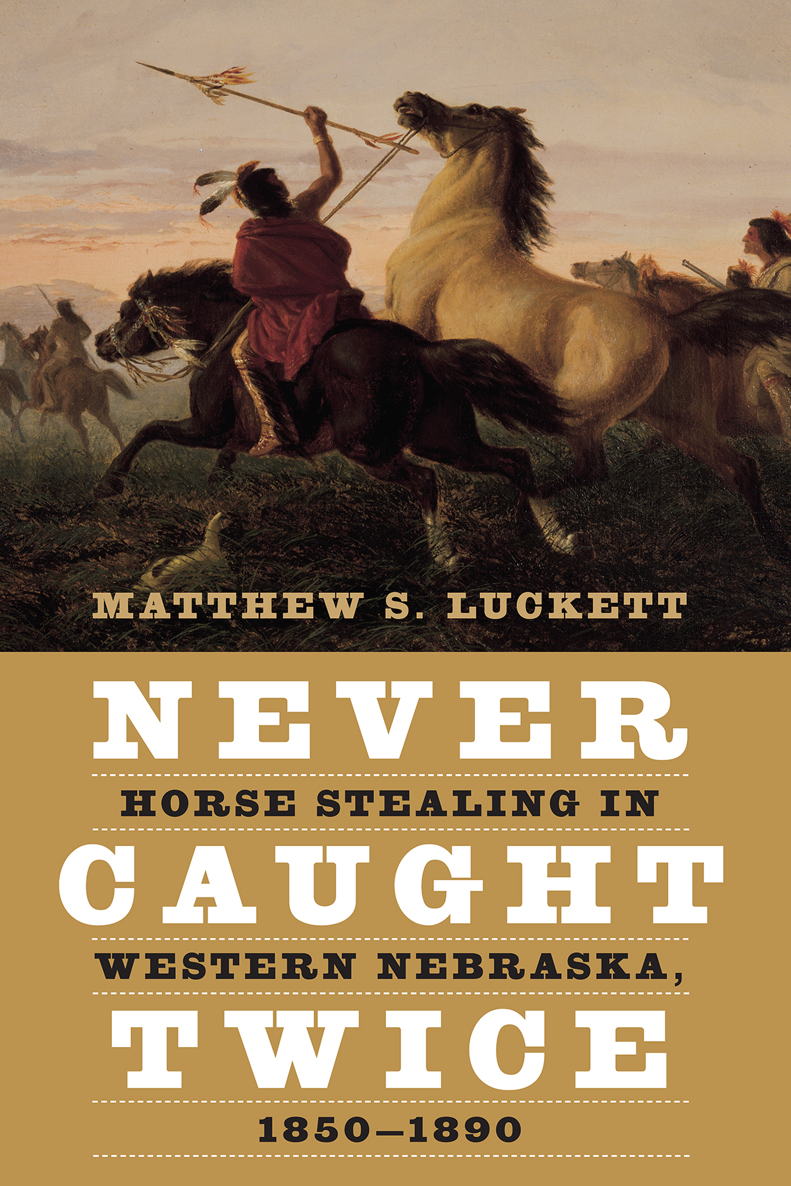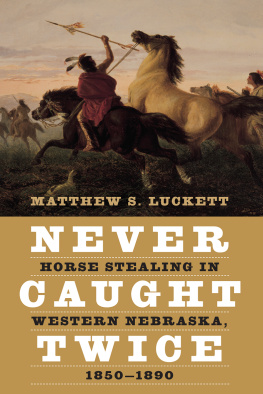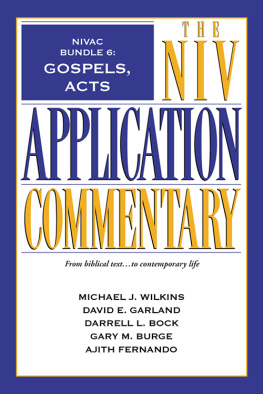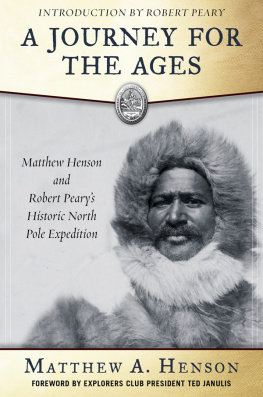Matthew S. Luckett - Never Caught Twice
Here you can read online Matthew S. Luckett - Never Caught Twice full text of the book (entire story) in english for free. Download pdf and epub, get meaning, cover and reviews about this ebook. publisher: University of Nebraska Press, genre: Politics. Description of the work, (preface) as well as reviews are available. Best literature library LitArk.com created for fans of good reading and offers a wide selection of genres:
Romance novel
Science fiction
Adventure
Detective
Science
History
Home and family
Prose
Art
Politics
Computer
Non-fiction
Religion
Business
Children
Humor
Choose a favorite category and find really read worthwhile books. Enjoy immersion in the world of imagination, feel the emotions of the characters or learn something new for yourself, make an fascinating discovery.
- Book:Never Caught Twice
- Author:
- Publisher:University of Nebraska Press
- Genre:
- Rating:5 / 5
- Favourites:Add to favourites
- Your mark:
- 100
- 1
- 2
- 3
- 4
- 5
Never Caught Twice: summary, description and annotation
We offer to read an annotation, description, summary or preface (depends on what the author of the book "Never Caught Twice" wrote himself). If you haven't found the necessary information about the book — write in the comments, we will try to find it.
Never Caught Twice — read online for free the complete book (whole text) full work
Below is the text of the book, divided by pages. System saving the place of the last page read, allows you to conveniently read the book "Never Caught Twice" online for free, without having to search again every time where you left off. Put a bookmark, and you can go to the page where you finished reading at any time.
Font size:
Interval:
Bookmark:

This is an intriguing and deeply significant contribution to the ongoing effort to demythologize the Wild West and adds an important new layer to the search for an identifiable legal culture in Nebraska and Great Plains history.
Mark Scherer, coauthor of Echo of Its Time: The History of the Federal District Court of Nebraska, 18671933
Despite what we think we know about horse theft, this is the first effort to pull it all together into a single study. It is good stuff!
Mark R. Ellis, author of Law and Order in Buffalo Bills Country: Legal Culture and Community on the Great Plains, 18671910
Never Caught Twice shows how creating and protecting private propertylivestock on the hoofrather than the advent of law and order defined Americas frontier settlement. Matthew Luckett is an excellent writer, deep thinker, and brave scholar.
Will Bagley, author of So Rugged and Mountainous: Blazing the Trails to Oregon and California
Matthew S. Luckett
University of Nebraska Press | Lincoln
2020 by the Board of Regents of the University of Nebraska
Cover designed by University of Nebraska Press; cover image: Charles Ferdinand Wimar (American, 18281862), Indians Stealing Horses, 1854, oil on canvas, Joslyn Art Museum, Omaha NE , Museum Membership Fund Purchase, 1951.80.
Parts of this book were originally published as part of my PhD dissertation, Honor among Thieves: Horse Stealing, State Building, and Culture in Lincoln County, Nebraska, 1850-1890, University of California, Los Angeles, 2014. Small sections were originally published as Cattle associations in Encyclopedia of Politics of the American West ( SAGE Publications, Inc., 2013).
All rights reserved.
Publication of this volume was assisted by the Virginia Faulkner Fund, established in memory of Virginia Faulkner, editor in chief of the University of Nebraska Press.
Library of Congress Cataloging-in-Publication Data
Names: Luckett, Matthew S., author.
Title: Never caught twice: horse stealing in Western Nebraska, 18501890 / Matthew S. Luckett.
Description: Lincoln: University of Nebraska Press, [2020] | Includes bibliographical references and index.
Identifiers: LCCN 2020007876
ISBN 9781496205148 (hardback)
ISBN 9781496223234 (epub)
ISBN 9781496223241 (mobi)
ISBN 9781496223258 (pdf)
Subjects: LCSH : Horse stealingNebraskaHistory19th century. | Indians of North AmericaGreat PlainsHistory19th century. | Frontier and pioneer lifeNebraskaHistory19th century.
Classification: LCC HV 6661. N 2 L 83 2020 | DDC 364.16/28636109782909034dc23
LC record available at https://lccn.loc.gov/2020007876
The publisher does not have any control over and does not assume any responsibility for author or third-party websites or their content.
For JoAnna,
Who always says more nice things
It is never a good idea to begin writing a history book without a central question in mind. Historical narratives, and scholarly monographs in particular, should answer some kind of salient query, even if it has never before been asked. Not only will the book then presumably (one hopes) answer that question, but the process of responding to it will also guide the author and their manuscript through the darkest parts of their journey. A single, coherent question can lend clarity when all the people and places and events start to blur and feel muddled. It is its own raison dtre and casus belli. The question is the signal in the noise.
This book does not have one. When my dissertation advisor suggested that I pivot from my study of rural antihorse thief associations toward the history of horse stealing as a crime instead, I confess that no single overriding question came immediately to mind. In fact, I had a hard time keeping all the questions straight. There were just so many: Were horse thieves actually hanged? If so, why? Why do so many people today believe that horse thieves were hanged? Why were horses so important? But pinning down these questions was a challenge as well since, as I tumbled down the research rabbit hole, I began to realize that Americans intuitively understand horse stealing just as well today as they did one hundred years ago. But somehow we have collectively lost our historical understanding of the crime. And how does one construct a question around that?
By an intuitive understanding, I mean that many Americans seem to have gained a latent understanding of horse stealing through popular culture. Western movies, television shows, books, and even video games like the Red Dead Redemption series have created a broader sense of awareness with respect to horse stealing and its severity. In addition, Americans can readily make the mental connection between horse ownership and vehicle ownership. In a nation of people who own personal automobiles or trucks, it is easy to associate a beloved twenty-first-century car with an equally admired and essential nineteenth-century horse. But these connections are not merely cultural and technological. Over the years, at conferences and workshops and even in my classrooms, several people have come up to me after learning what I am working on to say that their great-great-grandpa or uncle or some other ancestor was hanged for horse stealing. While I have no reason to doubt the veracity of any of their individual stories, the sheer number of times this has happened has made me wonder whether everyone in the western United States actually does have a horse thief hanging from their family tree or if some weird quirk of our collective historical memory causes us to believe such a thing. Even this question, however, is difficult to answer. The history of horse stealing is, in many ways, the story of ghosts, shadows, and rumors.
In an effort to dodge having to answer a single question, I have done the next best thing: I wrote a narrative that tells the history of horse stealing in western Nebraska. It is the story of a category of crime, the history of a means of exchange, and a powerful reminder of the durability of historical memory. Horse raiding among the Plains Indians quickly evolved into a critical adjunct to the nomadic lifestyle adopted by those tribes that fully embraced equestrian hunting, fighting, traveling, and acquiring wealth. It provided easy access to mounts, social mobility, and food security just as surely as it robbed those tribes on the losing end of subsistence and self-defense. Once whites began to travel through, and then later reside on, the Great Plains, large-herd managers began accumulating power and wealth more quickly than their less-well-off neighbors. As tensions between Indians and whites mounted, the animals themselves became contested resources. Several plains conflicts started with the theft of a strayed horse or cow, and by the time the Great Sioux War broke out, both sides understood that healthy horse herds were their opponents Achilles heel on the plains. After the Plains Indians were sent to live in reservations, white horse-stealing gangs siphoned away reservation horses before turning their attention to their white neighbors. By 1890 fewer thieves were stealing horses as increasingly prosperous locals bought better, smaller, and more easily fenced items to steal. But those homesteaders and other small-herd managers continued to fear horse thieveswith good reason. Spoken myths became printed legends, and old fears about horse thieves continued to haunt Nebraskans even as passing Model Ts kicked up clouds of dust along Nebraskas desiccated, unpaved roadways.
Next pageFont size:
Interval:
Bookmark:
Similar books «Never Caught Twice»
Look at similar books to Never Caught Twice. We have selected literature similar in name and meaning in the hope of providing readers with more options to find new, interesting, not yet read works.
Discussion, reviews of the book Never Caught Twice and just readers' own opinions. Leave your comments, write what you think about the work, its meaning or the main characters. Specify what exactly you liked and what you didn't like, and why you think so.











